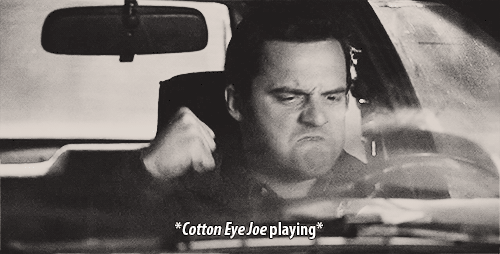What Is The Anatomy Of A Truly Loveable Television Idiot?
From Homer Simpson to Andy Dwyer, the loveable idiot is a comedy staple.

One of the truest and more purest joys in comedy is the loveable idiot.
They’re those delightful dum-dums who are as pure of heart as they are completely stupid. They’re comedy gold, existing in the sweet spot between an almost complete inability to function in life and being too good for this world. They range from being semi-believable people with some stupid moments to completely ludicrous, absurd creations who would surely have died at some time in childhood, perhaps from voluntary exposure. They are comedy gold.
The loveable idiot as a trope exists pretty widely in comedy, with some very famous examples– you’ve got your Homer Simpsons, your Joey Tribbianis. But it could be argued (by me, mostly) that the loveable idiot has been explored and perfected through the various Schurniverse extended television universe shows.
If you’re not aware, the Schurniverse is defined mostly as shows that writer and producer Mike Schur has worked on in some capacity, such as The Office, Parks and Recreation, Brooklyn Nine-Nine and The Good Place. New Girl is also in there, because of the whole crossover event they did. Don’t @ me!
Anyway, if you explore the Schurniverse, you find all the traits and tropes and stupid shit that goes into a perfect TV idiot. Let’s explore them.
Big Man-Children
Gosh, when you look at the list of loveable idiots on TV, it’s overwhelmingly straight and male. There are two possible reasons for this: women and queers are inherently smarter, OR there’s a weird gendered preference that allows men to still be seen as cute and (weirdly) viably attractive when they’re dumb as a packet of bricks?
Hmm.
Anyway, childish innocence and enthusiasm is one of the tropes that the loveable idiot has to have in spades. It’s part of their redeeming features, and will often be a major part of their “lovability”. Being a giant adult child gives them a purity and innocence and sometimes even a wisdom that their smarter brethren lack.
Andy Dwyer from Parks and Recreation is a great example of this — at the beginning of the show, he’s more of a deadbeat slacker type who sponges off Ann Perkins due to laziness and entitlement. By the end of the seven series arc, his childishness has been increased to the extent that he finds his calling as a children’s TV presenter, his flaws almost compulsively overlooked because of it, his stupidity tolerated and condoned and channelled usefully. His childishness redeems him.

But it’s also worth looking at Jake Peralta from Brooklyn Nine-Nine. Jake is on the opposite side of the scale to Andy — he’s a smart guy, a successful detective who knows how to solve crime. However, he has a hefty dose of child energy.
“Eyes closed, head first, can’t lose,” he says, perfectly mal-appropriating the Friday Night Lights quote, epitomising the reckless energy and delightful enthusiasm of the loveable idiot.
He hates vegetables, he has a bathtub full of mail, he eats copious amounts of candy. He has strong man-child tendencies, and it’s those moments which are the motivation for the majority of his loveable idiot tendencies and causes him grief — “top of a car police chase, my birthday wish came true” he says, before snapping his leg-bone on a car roof.
“The doctor says all my bleeding was internal — that’s where the blood is supposed to be!”
He’s not an idiot on his own — but his childishness does give him moments.
Emotionally Stupid
The loveable idiot doesn’t need to just be intellectually stupid — it helps, but it isn’t their defining feature.
People who are just ill-equipped in the brain to function within the real world are sometimes objects of pity, more than comedy. But that’s where being emotionally stupid comes in. Let’s look at New Girl’s Nick Miller. Once again — not Andy Dwyer levels of stupid. But as well as being odd, in the manner of a wilderness hermit or an old-timey gold prospector, he’s completely at the mercy of his own emotions. He is an idiot savant of feelings, a victim of his huge and tempestuous emotions.
His feelings are baffling to himself and that makes him both loveable and an idiot. It also makes him a weird mixture between an innocent child and a cantankerous old man.
It’s strangely simple comedy — every reaction he has can be cartoonishly ballooned into something spectacular and hilarious. Let’s look at his reaction to the common door, for example:
It’s another way to power the unbridled enthusiasm that signifies the loveable idiot, especially in the Schurniverse. If Nick Miller is enthusiastic, he’s MORE ENTHUSED THAN ANY OTHER PERSON.

It’s worth contrasting Nick Miller to Michael Scott from The Office. I would argue that Michael Scott is a bigger idiot and less loveable, but a lot of his stupidest moments are also driven by being tossed around by his emotions, like an old ball in the mouth of a huge slobbery dog. However, unlike Nick, the majority of Michael Scott’s emotions are centred in insecurity — jealousy, spite, pettiness, loneliness. He blows them up hugely, and it drives some of his worst and most endearing moments.
He’s also just fucking dumb too.

Too Dumb To Live
You can break comedy roles into two archetypes — the white face and the red nose (they’re old clowning terms, shut up). They’re basically just a play on different types of high and low status — adult and child, king and servant, boss and employee. The white face is higher status and wants order and logic — the Leslie Knope, the Captain Holt. The red nose is the bringer of chaos, the wildcard, the loose unit.
The loveable idiot is always the red nose.
In whatever scene they come into, they bring the capacity to hilariously derail things. Unlike many red noses, the loveable idiot is never malicious in their intention — they are just too stupid to understand that every reaction and response to practically any situation is chaotic and wrong.
See every scene with Andy Dwyer in Parks and Recreation for an example of this.
It’s also worth noting that while this is true on a macro level, it also exists on a line by line basis, and forms the structure of pretty much every verbal gag in the show.
Being this kind of constantly, dangerously stupid person is a necessary suspension of disbelief for the audience– the trope is that this kind of person is too stupid to successful remain alive. It’s what gives the character some spice, they are a danger to themselves and everyone around them.
But really, the only character who legitimately embodies this trope to its full extent is Jason Mendoza from The Good Place, who is so dumb that he did actually die from it, having suffocated himself inside a locked safe, believing that a snorkel would somehow help him breathe.
Not Actually A Person
If you push all these traits to their ultimate limit, if you created the biggest and most overblown loveable idiot, you’d get a kind of mewling newborn baby trapped in the body of a grown man, psychotically baffled and bewildered by not only everything around him, but by his own thoughts and feelings. This creature would be so delightfully idiotic that they would cease to actually be a person, more of a concept, an über idiot.
Oh, they’d be Derek from The Good Place.
Created by Janet, a kind of omniscient robot (not a robot) as a brand new rebound boyfriend, Derek is best described as “his brain is broken”. He has windchimes for a penis.
“Hope to same place you again, very now,” he says as a farewell. He is the epitome of the loveable idiot. Maximum Derek is the maximum idiot.
Every loveable idiot falls somewhere between the scale of Jake Peralta (super loveable, some idiotic moments) to Derek from The Good Place (absurdly idiotic, weirdly loveable). Where does your nice stupid friend fall on the scale? Play it at home!
—
Patrick Lenton is an author and staff writer at Junkee. He tweets @patricklenton. He’s an idiot, but kinda mean.
